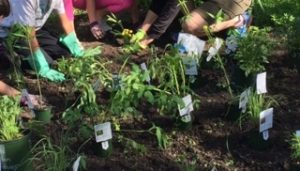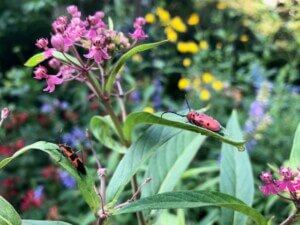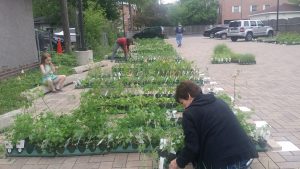Calling local non-profits and organizations! We are excited to announce our Garden for Nature Grant Program. This grant is for those who would like to improve the environment and engage the public through a native plant garden.
If you are part of a local non-profit that wishes to connect young people and nature, there is no better way (in our humble opinion) than to plant a native garden that grows with them and their curiosity.

Please complete our application form for consideration: Garden for Nature Grant Application.
The deadline to apply is February 20, 2023. The announcement will be made on March 20, 2023
If you’d like to read about last year’s grantees, please see this post. Grant amounts depend on the project, but we anticipate granting $100-$1,000 for projects.
Please read below for details regarding the application. You can preview the information needed for the application here: Preview
Information for Applicants:
Definitions:
Native plants are those that evolved naturally in North America. More specifically, native plants in a particular area are those that were growing naturally in the area before settlers introduced plants from distant places. In eastern and central North America, native plants typically grew in communities with species adapted to similar soil, moisture, and weather conditions. Some of the widespread communities included oak-hickory-chestnut and beech-maple forests, tallgrass and shortgrass prairies, and freshwater marshes. Additional communities occupied specialized niches,

including savannahs, fens, bogs, and flood plains. Importantly, native plants form the basis for complex ecological interactions. We recommend sourcing local ecotypes when possible.
Non-native plants are those plants brought to a region deliberately or accidentally by human actions. Without human action they would never be found growing in a region. Examples include burning bush, Norway maple, Kentucky bluegrass (originally from Europe), tulips, daylilies, daisies, etc.
A cultivar is any plant variety selectively bred by humans to enhance a particular characteristic of the plant, i.e. leaf colour, bloom colour, hardiness. You can identify a cultivar by the name on the label: Poa pratensis ‘shamrock’ = Kentucky Bluegrass ‘shamrock’ cultivar.
A Nativar is one term for a cultivar of a native species. The label will help you identify, e.g. Echinacea purpurea ‘Avalanche’ = Purple coneflower ‘Avalanche.’ This cultivated native has white flowers with green centers.
We will not fund nativars. Read this article for an explanation of why: Native, or Not So Much?
How many plants do I need?
1 plant/sq. ft. is typical. Use this handy calculator to try different densities and planting patterns. Planting more densely than is typically recommended has multiple benefits, but be sure to consider the mature plant’s height and spread.
Mulch
Grant funds cannot be used to purchase mulch. However, we recommend that you mulch around newly planted plants. Mulching reduces water loss, suppresses weeds, and helps build healthy soil. Many towns offer free mulch. Oak Park maintains a pile in the parking lot of Rehm Pool. Leaves also work. If you do buy mulch, stick with hardwood and avoid cypress or dyed mulches.
Where to buy plants:
West Cook Wild Ones Native Plant Sale Website (Spring sale will be opening in March.)

If from the West Cook Wild Ones annual plant sale, grantees will receive a discount this year. For our accounting purposes, we will still need to disburse a check to you, so you will need to purchase from the site.
In the spring, there are many native plant sales in the area. Local conservation and native plant organizations offer native plants for sale. You might end up purchasing from different places in order to acquire the different plants for your plan. Illinois Native Plant Society usually keeps an updated list for sales across IL. We will update the link once they have updated their site.
Here is a list from our site of local stores: Where to Get Native Plants
Good luck! We are so excited to support new native gardens to help improve the environment and enhance human health through the connection to nature. If you have any questions, please email us at [email protected] and please use the subject line: Garden for Nature Grant Program.
Click to apply: 2023 Garden for Nature Application Form
